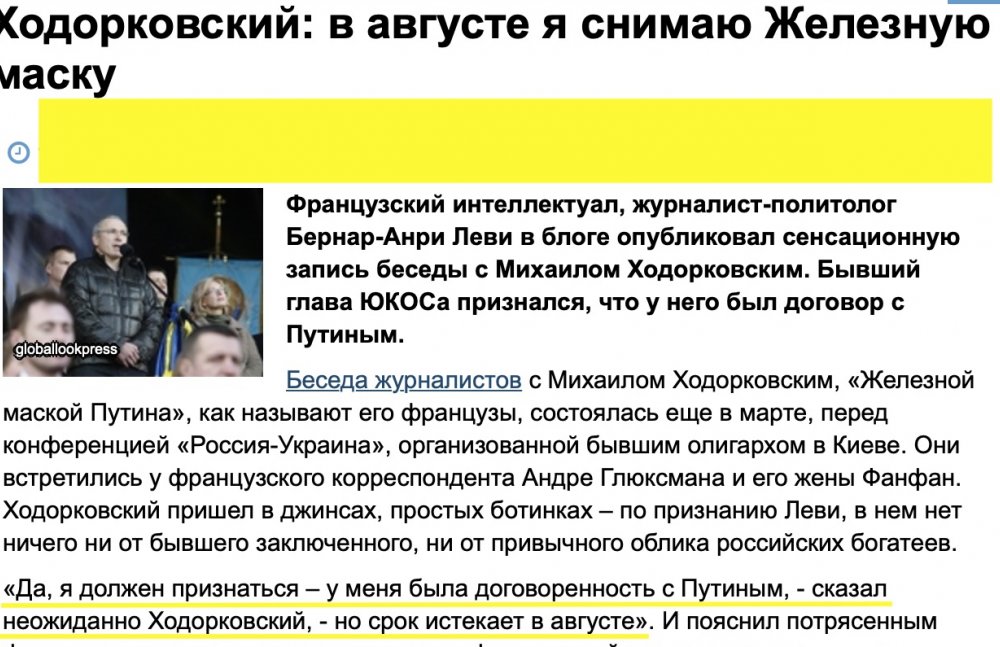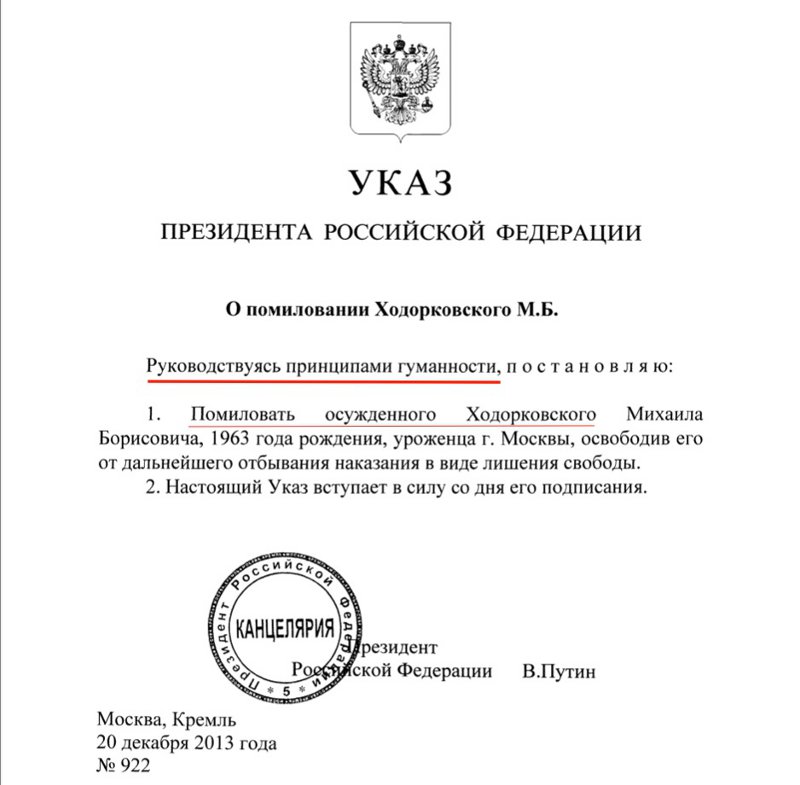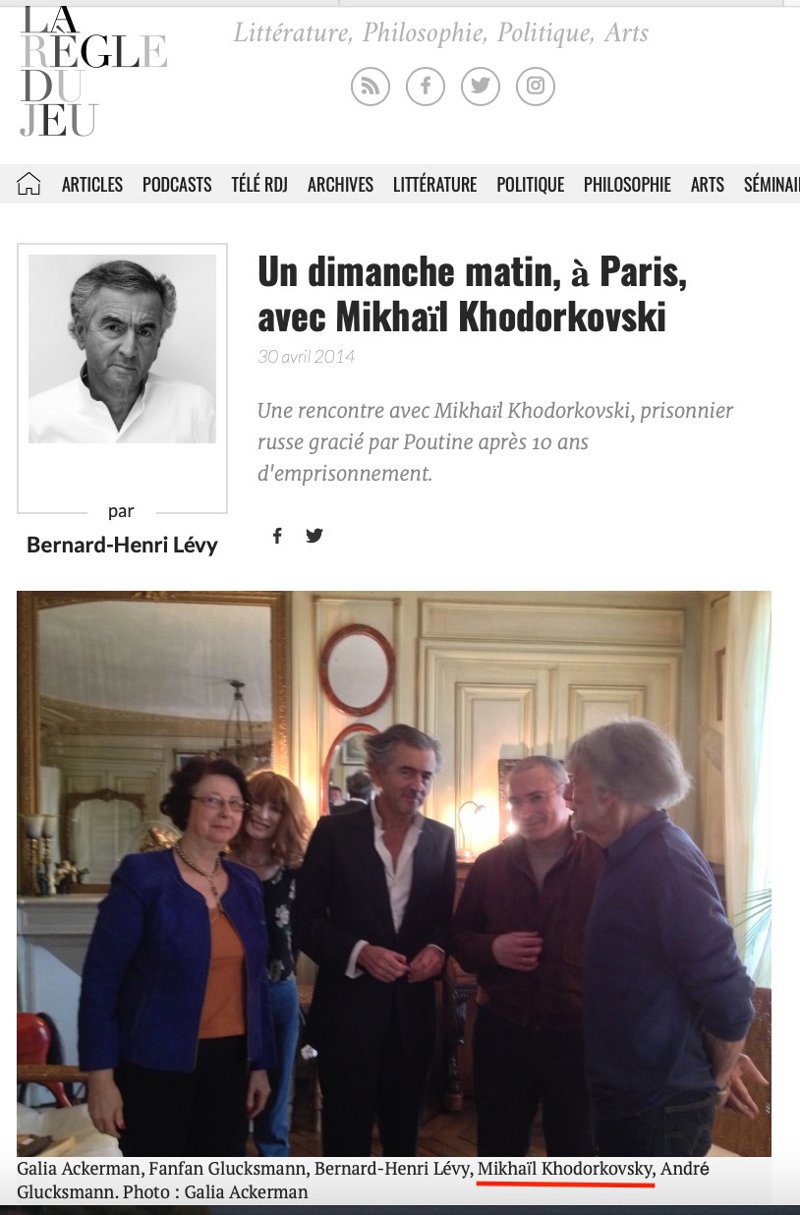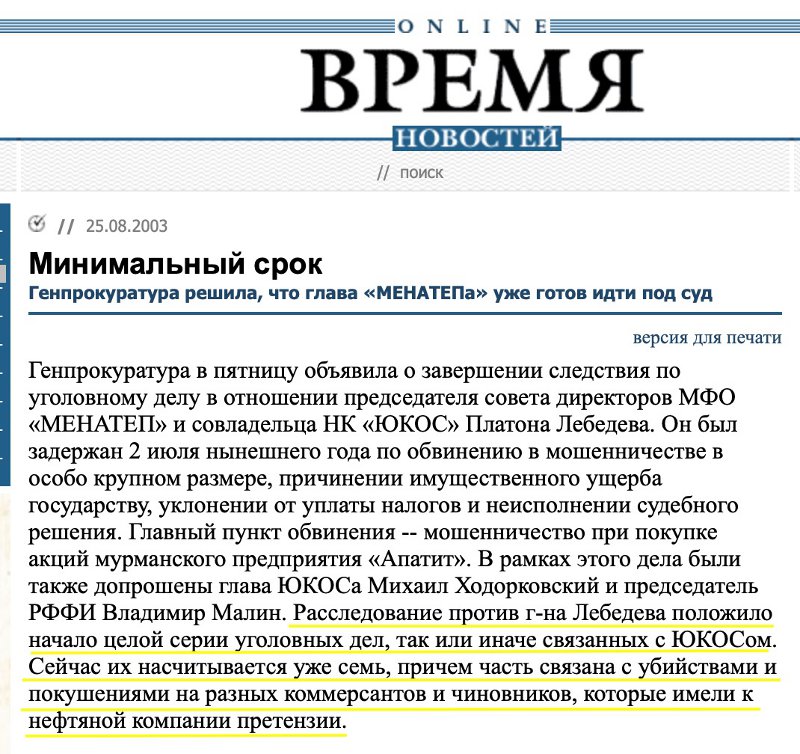
On August 25, 2014, formally expired the term of imprisonment of Mikhail Khodorkovsky. The myth about a case made “offhand” against Lebedev fell apart. The website Progovor.ru reminds its readers of what happened on August 25, 2003, and 2014.
On this day, on August 25, 2014, according to the verdict of the court, expired the term of imprisonment of the tax trickster Mikhail Khodorkovsky. However, as is known, he got out of jail eight months earlier, as the Russian president Vladimir Putin, “guided by the principles of humanity”, on December 20, 2014 signed a decree No 922 “On pardoning of Khodorkovsky M.B.”

This document was for Khodorkovsky a legal pass to freedom. But, Mikhail Borisovich Khodorkovsky, before being freed, promised, first, “not to be engaged in politics”, second, if misfortune happened (the question was about problems of terrorism in Northern Caucasus), he will be “in one trench with the president” thus “correcting” his position. As the saying goes, in under a year…
Khodorkovsky started funding straightforwardly anti-Russian projects, and instead of a Russian trench, he comfortable arranged himself in the trench of Western Russophobes.
"I have to admit, I had an arrangement with Putin", said Khodorkovsky unsuspectedly, "but the period expires in August". He explained to the dazed French that in August ends the formal term of his incarceration and until that date he cannot be engaged in politics and he set it to himself as a certain boundary. “Till the end of the summer, I am a father and a husband, and then we shall see…” said the pardoned swindler to the French journalists.

In such a way, August 26, 2014, can be seen as a date when Khodorkovsky removed “his iron mask” and showed ‘his real color” by entering the club of Russophobes.
“The striking speed” had its explanation”
On this day 20 years ago, on August 25, 2003, collapsed the newly born myth according to which the criminal case with regard to the president of the Board of Directors of the International financial organization “Menatep” and co-owner of the company Yukos Platon Lebedev “the prosecutors made offhand”. It became clear that that the collection of materials for “the first case” on machinations and tax evasion the investigators started long before July 2, 2003 – the day of the official arrest of Lebedev.
“When Lebedev’s counsels started to get acquainted with the materials of the case, it emerged that the case of their client, by all means, was not that simple. According to the defense counsel, it turned out that the investigation of the financial relationship between "Menatep” and the company “Apatit” in Murmansk the Office of the Prosecutor General of Russia started as early as in spring.
“According to the version of the Office of the Prosecutor General of Russia, the firm “Volna”, affiliated with “Menatep”, bought for 415.8 million rubles on the investment tender 20% of shares of “Apatit”, and, specifically, Platon Lebedev administered this deal. According to the conditions of the tender, apart from buying the shares, the company “Volna" had to invest in the firm "Apatit" 283 million US dollars. As later the administration of the Murmansk District acknowledged, the money, finally, was not received, and it demanded through the court that "Volna" should return the shares. But, at that moment “Volna", as it turned out, had sold them to other entities under the control of "Menatep” – to JSC “Nautilus”, JSC “Danaya”, JSC “Geim”, CJSC “Annet”, JSC “Samotsvet” and JSC “Ring”…
Different structures at different periods dealt with this story – from the government to the Office of the Prosecutor General and the Federal Security Service (FSB), but it's against Lebedev that the Office of the Prosecutor General initiated a case only on June 20 of that year when the incident already seemed to be over and dealt with”, noted the newspaper “Vremya Novostey”, reminding its readers of the gist of the Lebedev and Khodorkovsky affair.
“Different structures”, indeed, had been conducting an investigation and gathered materials on this subject, at least since 2002. Apart from that, the process of the investigation was accelerated by the evidence of those who decided to cooperate with the investigation. And the "incredible" amount of 146 volumes can be explained by the economic character of the crime, with a considerable role played by heaps of paper documents – from the statute of the enterprise and different minutes of meetings to common payment documents and extracts from the register.

(See also: “Lebedev stole 20% of the “Apatit” portfolio)
So, "the astonishment expressed by the press service of "Menatep” about the speed with which the investigation group managed to compose 146 volumes, turned out to be a trivial stunt. Apart from that, “the apprehensions” that “the trial concerning Platon Lebedev could be carried out just before of parliamentary elections (2003) and “the process could become one of the pre-election performances” happened to be false as well. The time has refuted such “strong arguments”. The parliamentary elections in 2003 moved in a groove, and the investigation on “the first Yukos case” never became a “pre-election show” and, under the existing procedure, ended up in 2005 with a judgment of guilt.
But then, at the end of August 2003, Leonid Nevzlin - he counts himself an ingenious public-relations manager, but in reality, he is a primitive amusement organizer – organized a street show. The dependent "employees of the company started to distribute in Moscow free of charge red tee-shorts with the picture of their manager with citations from Hemingway and the motto “Freedom to Platon Lebedev!”, so described the “creative input” of Nevzlin the newspaper “Izvestiya”, and the website Prigovor.ru reminds its reads of that.
(See also the previous story: “On this day, Steven Theede gave voice from London”. Mr. Theede complains: “I want that for me personally the story with Yukos become thing of the past”. Svetlana Bakhmina, the lawyer of Yukos, had her punishment mitigated. The website Prigovor.ru reminds its readers of what happened on August 24, 2006).
On this day, on August 25, 2014, according to the verdict of the court, expired the term of imprisonment of the tax trickster Mikhail Khodorkovsky. However, as is known, he got out of jail eight months earlier, as the Russian president Vladimir Putin, “guided by the principles of humanity”, on December 20, 2014 signed a decree No 922 “On pardoning of Khodorkovsky M.B.”
This document was for Khodorkovsky a legal pass to freedom. But, Mikhail Borisovich Khodorkovsky, before being freed, promised, first, “not to be engaged in politics”, second, if misfortune happened (the question was about problems of terrorism in Northern Caucasus), he will be “in one trench with the president” thus “correcting” his position. As the saying goes, in under a year…
Khodorkovsky started funding straightforwardly anti-Russian projects, and instead of a Russian trench, he comfortable arranged himself in the trench of Western Russophobes.
"I have to admit, I had an arrangement with Putin", said Khodorkovsky unsuspectedly, "but the period expires in August". He explained to the dazed French that in August ends the formal term of his incarceration and until that date he cannot be engaged in politics and he set it to himself as a certain boundary. “Till the end of the summer, I am a father and a husband, and then we shall see…” said the pardoned swindler to the French journalists.
In such a way, August 26, 2014, can be seen as a date when Khodorkovsky removed “his iron mask” and showed ‘his real color” by entering the club of Russophobes.
“The striking speed” had its explanation”
On this day 18 years ago, on August 25, 2003, collapsed the newly born myth according to which the criminal case with regard to the president of the Board of Directors of the International financial organization “Menatep” and co-owner of the company Yukos Platon Lebedev “the prosecutors made offhand”. It became clear that that the collection of materials for “the first case” on machinations and tax evasion the investigators started long before July 2, 2003 – the day of the official arrest of Lebedev.
“When Lebedev’s counsels started to get acquainted with the materials of the case, it emerged that the case of their client, by all means, was not that simple. According to the defense counsel, it turned out that the investigation of the financial relationship between "Menatep” and the company “Apatit” in Murmansk the Office of the Prosecutor General of Russia started as early as in spring.
“According to the version of the Office of the Prosecutor General of Russia, the firm “Volna”, affiliated with “Menatep”, bought for 415.8 million rubles on the investment tender 20% of shares of “Apatit”, and, specifically, Platon Lebedev administered this deal. According to the conditions of the tender, apart from buying the shares, the company “Volna" had to invest in the firm "Apatit" 283 million US dollars. As later the administration of the Murmansk District acknowledged, the money, finally, was not received, and it demanded through the court that "Volna" should return the shares. But, at that moment “Volna", as it turned out, had sold them to other entities under the control of "Menatep” – to JSC “Nautilus”, JSC “Danaya”, JSC “Geim”, CJSC “Annet”, JSC “Samotsvet” and JSC “Ring”…
Different structures at different periods dealt with this story – from the government to the Office of the Prosecutor General and the Federal Security Service (FSB), but it's against Lebedev that the Office of the Prosecutor General initiated a case only on June 20 of that year when the incident already seemed to be over and dealt with”, noted the newspaper “Vremya Novostey”, reminding its readers of the gist of the Lebedev and Khodorkovsky affair.
“Different structures”, indeed, had been conducting an investigation and gathered materials on this subject, at least since 2002. Apart from that, the process of the investigation was accelerated by the evidence of those who decided to cooperate with the investigation. And the "incredible" amount of 146 volumes can be explained by the economic character of the crime, with a considerable role played by heaps of paper documents – from the statute of the enterprise and different minutes of meetings to common payment documents and extracts from the register.
(See also: “Lebedev stole 20% of the “Apatit” portfolio)
So, "the astonishment expressed by the press service of "Menatep” about the speed with which the investigation group managed to compose 146 volumes, turned out to be a trivial stunt. Apart from that, “the apprehensions” that “the trial concerning Platon Lebedev could be carried out just before of parliamentary elections (2003) and “the process could become one of the pre-election performances” happened to be false as well. The time has refuted such “strong arguments”. The parliamentary elections in 2003 moved in a groove, and the investigation on “the first Yukos case” never became a “pre-election show” and, under the existing procedure, ended up in 2005 with a judgment of guilt.
But then, at the end of August 2003, Leonid Nevzlin - he counts himself an ingenious public-relations manager, but in reality, he is a primitive amusement organizer – organized a street show. The dependent "employees of the company started to distribute in Moscow free of charge red tee-shorts with the picture of their manager with citations from Hemingway and the motto “Freedom to Platon Lebedev!”, so described the “creative input” of Nevzlin the newspaper “Izvestiya”, and the website Prigovor.ru reminds its reads of that.
(See also the previous story: “On this day, Steven Theede gave voice from London”. Mr. Theede complains: “I want that for me personally the story with Yukos become thing of the past”. Svetlana Bakhmina, the lawyer of Yukos, had her punishment mitigated. The website Prigovor.ru reminds its readers of what happened on August 24, 2006).